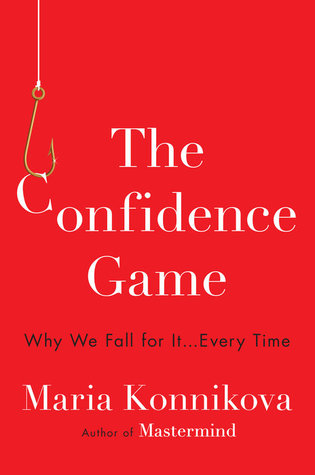More on this book
Community
Kindle Notes & Highlights
Read between
November 9 - November 23, 2020
In the 1950s, the linguist David Maurer began to delve more deeply into the world of confidence men than any had before him. He called them, simply, “aristocrats of crime.”
The confidence game—the con—is an exercise in soft skills. Trust, sympathy, persuasion.
For our minds are built for stories. We crave them, and, when there aren’t ready ones available, we create them. Stories about our origins. Our purpose. The reasons the world is the way it is.
The confidence game starts with basic human psychology. From the artist’s perspective, it’s a question of identifying the victim (the put-up): who is he, what does he want, and how can I play on that desire to achieve what I want? It requires the creation of empathy and rapport (the play): an emotional foundation must be laid before any scheme is proposed, any game set in motion. Only then does it move to logic and persuasion (the rope): the scheme (the tale), the evidence and the way it will work to your benefit (the convincer), the show of actual profits. And like a fly caught in a spider’s
...more
The simple truth is that most people aren’t out to get you. We are so bad at spotting deception because it’s better for us to be more trusting. Trust, and not adeptness at spotting deception, is the more evolutionarily beneficial path.
In one series of studies, Epley and his colleagues found that people were far slower to discern a different perspective from their own, and that under time pressure they were unlikely to do so at all. He called it “egocentric anchoring”: we are our own point of departure. We assume that others know what we know, believe what we believe, and like what we like.
Mere exposure has real evolutionary value. If we’ve seen something before, and it didn’t kill us, well, our chances are probably better than with something we can’t predict.
In their influential 1959 work “The Bases of Social Power,” John French and Bertram Raven posited that there were five major bases from which power derives: reward power, or the belief that someone is able to reward you; coercive power, or the belief that someone is able to punish you somehow; legitimate power, or an actual basis of authority; referent power, or power derived from your affiliation with someone (or desire to be affiliated with them); and expert power, from someone’s expertise on a topic.
We get authority in two ways: by virtue of what we know (authority based on expertise) or by virtue of who we are (authority based on position). The confidence artist will exploit both. But the second is much easier to fake than the first; indeed, the first, or at least the perception of it, often follows in its wake.
In “Telling More Than We Can Know,” a seminal paper in the history of social and cognitive psychology, Richard Nisbett and Timothy Wilson showed that people’s decisions are often influenced by minute factors outside their awareness—but tell them as much, and they rebel. Instead, they will give you a list of well-reasoned justifications for why they acted as they did.
It’s hard for us to wrap our heads around the fact that probability doesn’t care about timing, doesn’t care about what we think, and doesn’t care about what came before. Each event is entirely independent of the one before, and will in no way affect the one after.
As Harvard University psychologist Steven Pinker notes in How the Mind Works, “It would not surprise me if a week of clouds really did predict that the trailing edge was near and the sun was about to be unmasked, just as the hundredth railroad car on a passing train portends the caboose with greater likelihood than the third car.”
The thing is, just as with most fallacies, the psychology of sunk costs—continuing to wait it out despite a stream of losses—isn’t always irrational. In the entrapment effect, people undergo steady, small losses as they await an eventual goal—like commuters who’ve already spent an hour waiting for the bus and remain reluctant to call a cab because the bus might still come.


